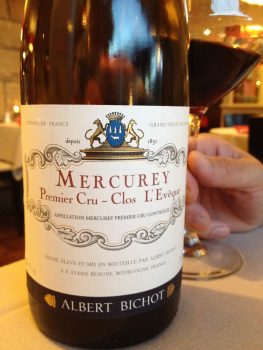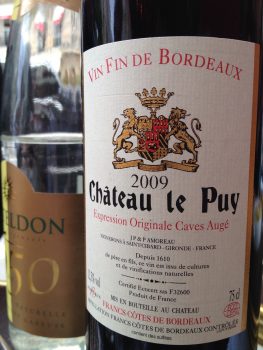Pour ceux et celles qui aiment le vin * Posted by Tim Hildreth on Jul 12, 2016 in Culture, Vocabulary
Ma tante Rose au Québec envoie souvent des courriels** avec des devinettes, des chansons, des images ou autre qu’elle trouve amusants. / My aunt Rose in Quebec often sends e-mail with riddles, songs, images, or other things she finds amusing. This week she sent one that, given last week’s discussion of meals and table settings, seemed like a fun one to share. Like many things that circulate on the internet, there is no provenance for what follows, but I hope you’ll find it as humorous as I did.
I’ll share it here without translation so you can see how much you understand unaided. The full text and translation can be found further down the page after a discussion of some useful vocabulary.
Le vin devient meilleur avec le temps.
Plus je vieillis, plus je l’aime.
Les gens disent que boire du lait ça rend fort.
Bois 5 verres de lait et essaye de bouger un mur.
Tu ne peux pas?
Maintenant, bois 5 verres de vin.
Le mur va bouger par lui-même.
Le secret pour jouir d’un bon vin:
1. Ouvre la bouteille et laisse-la respirer.
2. Si elle ne paraît pas respirer, donne-lui le bouche à bouche.
Bois un peu de vin, tu te sentiras mieux.
Si un verre de vin est bon pour toi…
Imagine-toi ce qu’une bouteille au complet peut faire!
On m’a dit qu’on pouvait faire des cubes de glace avec les restes de vin.
J’étais confus…qu’est-ce que des restes de vin?
You might recall from my Portpourri post a few weeks back, that I would be sharing my vocabluary explorations with you. This week, two words that relate directly to last week’s blog.
le dîner vs. le souper – In English, many people today use the terms “dinner” and “supper” interchangeably. In French, the words have distinct origins and their usage varies from family to family and country to country. My Canadian family and friends generally refer to the mid-day meal as “le dîner” and the evening meal as “le souper” (so, no “déjeuner” for them!). My French friends and family use “le dîner” to refer to the evening meal, usually eaten around 7 or 8 p.m. They would call ‘un souper’ a light meal (often just soup . . . hence the name!) taken later at night (or even early in the morning if you’ve been up very late . . . ‘le soupe à l’oingnon’ is a favorite!)
Le vin devient meilleur avec le temps. / Wine improves with age.
Plus je vieillis, plus je l’aime. / The older I get, the more I like it.
Les gens disent que boire du lait ça rend fort. / People say that drinking milk makes you strong.
Bois 5 verres de lait et essaye de bouger un mur. / Drink 5 glasses of milk and try and move a wall.
Tu ne peux pas? / No luck? (You can’t?)
Maintenant, bois 5 verres de vin. / Now drink 5 glasses of wine.
Le mur va bouger par lui-même. / The wall will move all by itself.
Le secret pour jouir d’un bon vin: / The secret to enjoying a good wine:
1. Ouvre la bouteille et laisse-la respirer. / 1. Open the bottle and let it breathe.
2. Si elle ne paraît pas respirer, donne-lui le bouche à bouche. / 2. If it doesn’t seem to be breathing, give it mouth-to-mouth.
Bois un peu de vin, tu te sentiras mieux. / Drink a little wine, you’ll feel better.
Si un verre de vin est bon pour toi… / If one glass of wine is good for you …
Imagine-toi ce qu’une bouteille au complet peut faire! / Just think what a whole bottle can do!
On m’a dit qu’on pouvait faire des cubes de glace avec les restes de vin. / I was told that you can make ice cubes with left over wine.
J’étais confus…qu’est-ce que des restes de vin? / I was confused…what is left over wine?
And finally this week, I know it’s a few days early, but in honor of Bastille Day later this week, here’s a fun little video about the French Revolution!
* For those who like wine
** ‘courriel’ is a word that originated in Quebec. It is a portmanteau (or ‘mot-valise’ as they’d say in French!) formed of the words ‘courrier’ / mail and ‘électronique’ / electronic. ‘Portmanteau’ is also a word we get from French. In French it refers to an old fashion case for carrying coats or cloaks (from ‘porter’ / to carry + ‘manteau’ / cloak, mantle, coat). In English, a portmanteau word is one formed from parts of two other words to create a new word.

Build vocabulary, practice pronunciation, and more with Transparent Language Online. Available anytime, anywhere, on any device.





